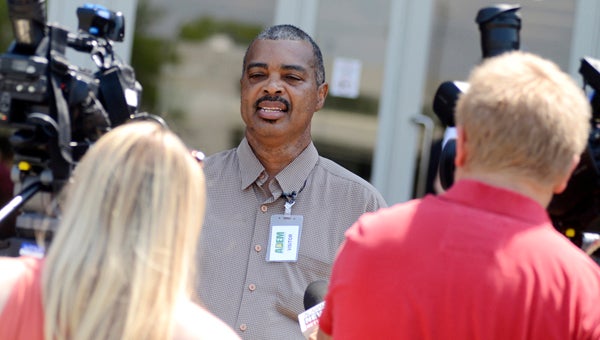Uniontown wastewater dilemma hits roadblock in Montgomery
Published 9:22 am Saturday, June 21, 2014

Ben Eaton, vice president of the Black Belt Citizens Fighting for Health and Justice, speaks with members of the media about the ongoing wastewater treatment issues in Uniontown before a meeting of the Alabama Environmental Management Commission Friday morning in Montgomery. — Jay Sowers
MONTGOMERY — The battle over Uniontown’s inadequate wastewater treatment facilities went to the state capitol Friday, and it is clear residents of the rural Perry County community may have to wait a bit longer before a solution is found.
Dozens of Uniontown residents attended a public hearing of the Alabama Environmental Management Commission Friday to hear what happens next in the project that has already seen $4.8 million in taxpayer money that many say has been flushed down the drain.
A wide range of issues with the city’s antiquated treatment systems — including leaking pipes, numerous instances of wastewater seeping into nearby creeks and two wastewater spray fields that cannot handle the current water usage levels — have made the situation a difficult one to solve.
Nelson Brooke spoke on behalf of the Black Warrior Riverkeeper, Inc., saying ADEM should never have allowed the construction of a second wastewater sprayfield. Brooke said the design of the second sprayfield was too similar to that of the city’s old sprayfield that had long been the source of wastewater leakage that has found its way into surrounding groundwater and streams.
“If this agency is going to entertain an upgrade to a system and permit it, it should be responsible for ensuring that it is an adequate fix, and that it’s not going to be a complete waste of public dollars,” Brooke told the commission. “That’s precisely what happened.”
In pointed comments moments after Brooke left the microphone Friday, Lance LeFleur, director of ADEM, said ADEM is not responsible for the design of Uniontown’s wastewater facilities, and thus, was not to blame for the ongoing environmental quagmire.
“Mr. Brooke is ill-informed on the regulatory process. He does not understand what statutory authority the department has and the commission has,” LeFleur said. “The department is not authorized, nor does it have the resources, to design wastewater treatment plants or review wastewater treatment plant designs. He does not understand that the responsibility for the design and operation of wastewater treatment plants lies solely with either a city authority for wastewater treatment plants, or the city fathers themselves.”
LeFleur said he has been working constantly with local, state and federal entities to find a solution — and much needed funding — for the project.
“Over the past two years, the department has met with the USDA, EPA, the mayor of Uniontown, members of the Uniontown city council, Uniontown citizens groups, Congresswoman Terri Sewell, design engineers, operating engineers and others regarding the Uniontown wastewater treatment plant,” LeFleur said.
While Uniontown resident and Black Belt Citizens Fighting for Health and Justice vice president Ben Eaton is glad to see the city’s issues gaining the attention of elected officials and environmental agencies, he wonders if the community’s rural location is one reason the problem has gone on so long without being fully addressed.
“We ask if these kinds of acts have happened in Hoover, Ala.? We ask who is responsible for Uniontown being in the situation they are in today?” Eaton asked the committee.
In the coming weeks and months, all the involved parties will continue discussions on the matter. Once a solution is found, the first challenge will be to find the necessary funding.
Uniontown Mayor Jamaal Hunter said Friday the solution must take into account the financial realities of residents and business in the community.
“We don’t have $1 million in our coffers,” Hunter said. “We are relying on federal assistance. And it is no use raising the water rates of our citizens if they can’t pay them. We have to find a solution that is friendly to both our commercial and residential customers. We just can’t raise their rates through the roof.”
W. Scott Phillips, vice chair of AEMC, said the commission is keenly aware of the dire financial status of the wastewater project in Uniontown, and would do their part to find the needed funding.
“As we talk to [LeFleur] about what challenges he sees in people that don’t have money coming up, we’re going to have to start talking to the Legislature and either get some authority to do something different, or see if there is a way the state can find funding for people like this,” Phillips said.
Even as a solution and funding are sought out, Eaton said his organization would continue to keep issues surrounding the wastewater treatment facilities on the radar of ADEM.
“We have to make sure we are constantly sending complaints to ADEM,” Eaton said after Friday’s meeting. “We will be active as long as this project is active.”




